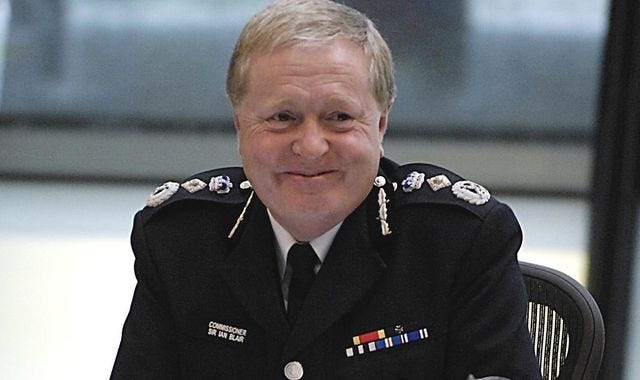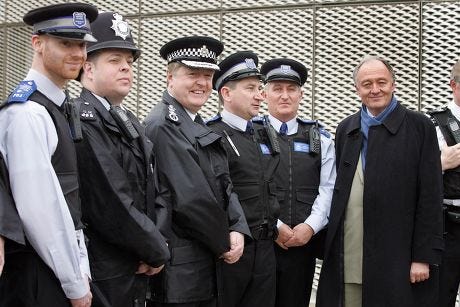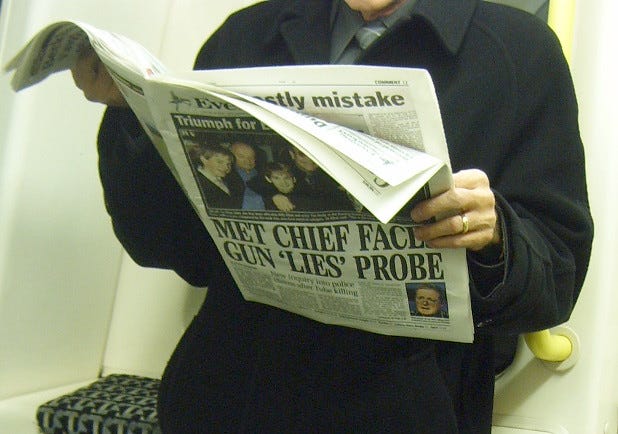A very political Commissioner
Ian Blair was the most consequential police officer of his generation
‘The police are not merely the servants of the state, but also the guardians of fairness in society.’ The problem with Blair’s worldview laid bare - define ‘fairness’, please?
In October 2008, when Sir Ian Blair resigned (or was sacked, take your pick) as Commissioner of the Metropolitan Police, I popped the cork on a bottle of champagne. I bitterly resented Blair’s management of counter-terrorism. His decisions, ultimately, adversely impacted on my family and my health. I strongly believed, and still do, the direction he took the organisation was deeply flawed. Blair’s instinct for self-preservation after Stockwell disgusted me - a truly honourable man would have resigned immediately.
When I heard of Sir Ian’s death last night, at the relatively young age of 72, I messaged old friends. None remembered him particularly fondly, one mentioning with disgust Blair’s decision to permit police protection vehicles to display Labour party livery. I’m sure other recollections will vary, and that Sir Ian has his friends and supporters too.
None of this changes the significance of Sir Ian Blair’s legacy. Indeed, I am strongly of the view Blair - who was only Commissioner for three years - was possibly the most consequential police officer of his generation. Perhaps, even, since Lord Trenchard.
This isn’t to say, however, the consequences were all positive.
It’s not my job to write fawning obituaries; powerful people, like Commissioners of the UK’s largest police service, make decisions impacting on the lives of others. ‘Big Picture’ people must be thick-skinned. Besides, London coppers - as a rule - have little time for ‘Metro One’ (the Commissioner’s radio callsign). The scale of the organisation means the Boss is bound to piss people off.
This isn’t to say Commissioners can’t indulge in effective PR. Take, for example, Blair’s predecesor, Sir John Stevens (now Baron Stevens of Kirkwhelpington). My favourite description of Sir John originates from my least favourite newspaper, The Guardian, who described him as ‘The Queen Mother of British Policing.’ Broad of chest and ruddy of cheek, John Stevens looked like a copper. He was, according to myth, adored by his troops. He policed London with an old-school, no-nonsense style.
This was a narrative, of course. Sir John was undeniably an impressive figurehead. A man with a hinterland, too - a lover of wine, aviation and charity work. Yet, talk to a few of those who worked under him - especially when he was a senior detective - and you’ll hear of a tendency to bully. A certain arrogance. He folded when David Blunkett demanded the introduction of PCSOs. Ali Dizaei wrought entirely predictable - and preventible - havoc on Stevens’s watch.
We all have feet of clay. Narratives, I suppose, distract people from studying our feet for too long.
The estimable Sir John Stevens, ‘The Queen Mother of British Policing.’
Which brings me to Ian Warwick Blair, latterly Lord Blair of Boughton. The accepted narrative around Blair is straightforward; he was New Labour’s politically-correct stooge. He ushered in an era of openness and diversity. Then, after Stockwell, his antediluvian critics at New Scotland Yard began circling. Blair’s fate was thus sealed, the assassin’s knife wielded by Boris Johnson.
Let’s unpack that, as the kids say. It’s a narrative suggesting personalities, rather than external forces, ultimately shape events. Yet events and personalities are both players in an asymmetrical chess match. In the early 2000s, the post-Macpherson Met was in New Labour’s crosshairs. The Blairite Reformation demanded a Britpop police service, better to serve Tony’s Cool Britannia. Cometh the moment, cometh the man - Ian Blair, a thinking-person’s police officer with progessive, reforming zeal. An Oxford English graduate (a 2:2), a 1968-era Boomer and would-be actor. In this respect, the young Ian’s decision to join the police seems apposite; unable to find a home in the theatre, he donned blue serge and played a policeman instead.
Although, on the fast-track, Blair was never in one place for long. A man in a hurry, possibly enjoying being the most educated (if not necessarily shrewdest) guy in the room. It’s easy to see how Blair might have come to resent police culture, given the reception a liberal-minded ‘flyer’ would have received in a 1970s police canteen or CID office (stories of his time as a Met DI, for example, paint him as an officious martinet).
The stars aligned just-so, Blair and his acolytes launched British policing into a future of diversity-obsession, knee-taking and mediocrity. A future of censoriousness and dictatorial management, one where increasingly risk-averse ‘leaders’ subcontracted policing’s dirty work to underlings forever denied command rank. Fodder, to be thrown under buses. A generation of technocrat cops, slaves to Human Rights maximalism, who saw the world as they would have liked it to be, rather than as it was. An elite obsessed with, yet terrified of, the news media. As I mentioned elsewhere, of an article Sir Ian wrote on policing’s future;
Blair described how he would change policing to meet the demands of a new century, about how rapid developments in technology, society and culture required a brave new service. One attuned to social justice, crime prevention, safeguarding and unicorns-dancing-on-rainbows. To achieve this, he declared, a new model copper was required. Blair declared the type of people typically attracted to policing were the wrong sort of people to make his radical new service work. When he was boss, Blair presumably thought most of his workforce were already redundant.
And yet…
Blair’s most significant achievement - one of real substance - is his most overlooked. Even by me, until now.
Sir Ian with Ken Livingstone, and Safer Neighbourhood officers. Despite his reputation as a left-wing radical, as mayor Livingston supported robust policing.
Imagine an alternative timeline, one where Sir Ian Blair never made it to the top. Instead, he became deputy to (say) Sir Hugh Orde, quite possibly the best Commissioner the Met never had. Blair’s given carte blanche to implement radical changes to neighbourhood policing, his more progressive tendencies tempered by the pragmatic and politically astute Orde (a former Chief Constable of the Police Service of Northern Ireland).
While Orde steadied the ship, keeping his gimlet eye focused on terrorism, public order and serious crime, Blair blazed a trail with his Safer Neighbourhoods initiative. He was passionate about reestablishing high-quality local policing, making it the Met’s inalienable bedrock. The efficacy and methodology of Safer Neighbourhoods in practice remains debtable. This doesn’t distract from what Blair achieved in this field - more so than any other recent commissioner.
Once Safer Neighbourhoods was sacrificed, after the 2010 Theresa May apocalypse, it was sorely missed. A generation of officers will remember the project. I suspect it will be a significant influence on future reform. This I would argue, for a progressive copper like Ian Blair, is a significant legacy. One, which for all his faults, he should be remembered.
He won’t be, of course, but that’s how the cookie of history often crumbles.
In the real world, though, fate continued its game of asymmetrical chess. Sir Ian became Commissioner and Sir Hugh Orde was sidelined. The 7th July bombings, and Stockwell, would dominate Blair’s time and energies - not his beloved Safer Neighbourhoods.
He would never recover.
I only ever met Sir Ian Blair once, some nine months after the Stockwell shooting. I’d been posted to the unit involved in the operation. I was a newcomer, but John Charles de Menezez’s death loomed large. Furthermore, inside ‘SO’ - Specialist Operations - we were told a new narrative was being spun; Special Branch were to blame for the fiasco. Firearms teams and detectives were led astray by sloppy intelligence and surveillance work. Given Blair had already decided to disband the Branch, we were a convenient scapegoat.
Blair’s visit was for reasons I won’t discuss. Suffice to say it was another matter on which his reputation allegedly hung. We were told, sotto voce, one more cock-up and Blair was toast. The Commissioner, oyster-eyed and nervy, sat in front of forty or so Branch officers at Tintagel House in Vauxhall. ‘I know nothing about surveillance,’ was his starter for ten. We knew that already. Then he told us a story about sitting in the back of an OP van in the 1970s.
The room was silent. Tense. We knew we were for the chop. Blair chuntered on, explaining how our work was important, but we had to accept the need for change. Or something. It was a strange episode. Even now, I wonder what the purpose of the visit was. Commissioners seldom visited, certainly not for the reasons offered. Eventually, Blair left with his staff officer and our management team.
The coast was clear. ‘What a wanker,’ muttered a DC.
Blair’s legacy will always turn on the shooting of Jean Charles de Menezez.
Ian Blair, it transpired, wasn’t the right man to lead the Met through a counter-terrorism campaign. Appointing him to the role, so soon after 9/11, was an act of hubris by an Establishment believing ‘it couldn’t happen here.’
Until July, 2005, when it did.
I don’t intend to relitigate Stockwell. Millions of words have been written on the subject, and my involvement was tangential; I only know what those involved have shared with me. What I shall comment on is how the incident reflects on Ian Blair's legacy, and how it sowed the seeds of his destruction. It also suggests a high-minded, even otherworldly, character. A man ill-suited to the grubby, knife-fighting realities of Scotland Yard arse-covering.
In the mid-2000s, the Met was in its pomp, swaggering at its imperial zenith. It was led by a coterie of senior officers given to acting like Soviet generals. A few enjoyed cosy relationships with News International. They bullied, bent rules and generally did as they wished. Even Home Secretaries kept an eye on what the Met might say or do in the shadows. In retrospect, the Yard’s hubris invited revenge.
In short? New Scotland Yard made ‘Game of Thrones’ look like a suburban PTA. These were the characters on whom Sir Ian Blair was forced to rely after 7/7 - gnarly operators, the sort of coppers he’d have found distasteful in other circumstances. I suspect the dark arts required to manage the fallout from Stockwell put Blair at their mercy.
Ever since, Metropolitan Police Commissioners have served at the mercy of politicians, activists and the media. Paul Stephenson left under a cloud. Cressida Dick - a fellow survivor of the Stockwell debacle - was defenestrated by another scheming mayor. Bernard Hogan-Howe escaped relatively unscathed, but very much unloved. The Met he left behind, though, was a smoking ruin.
And so, just over a week from the 20th anniversary of Jean Charles de Menezez’s death, Sir Ian Blair has passed away. The irony will not be lost on those of us who were in the Met at the time. We all have feet of clay. We all end up in the boneyard, or as ashes scattered to the wind. We are all someone’s family and friend. Yet, to those choosing the privilege of leadership, comes the burden of scrutiny. Which means we should discuss Sir Ian’s faults while acknowledging his genuine commitment to honest, decent local coppering.
So, RIP Ian Blair.








For many ex and some still serving Met officers, Sir Ian Blair’s term as Commissioner may not be looked back upon favourably.
He oversaw the 2005 summer bombings in London and the disastrous shooting of Jean Charles de Menezes but in my opinion, like several commissioners over the years, especially Cressida Dick, he was dealt a poisonous hand from the outset.
Painted as a Tony Blair appointed, university educated liberal by both his predecessor, Sir John Stephens and the mainstream media, he had an uphill battle even before his very first day in office.
He was certainly a very different animal to Stephens who ran the Met like General Patton ran the US third army. My experience of Sir Ian was very different.
I met him several times during my career and always found him personable and professional.
On one specific occasion I witnessed him make a split second decision to authorise a tactical capability that his predecessor had pontificated over for three years.
I also had the privilege in 2016, when we were both long retired, of interviewing him for several hours whilst filming the documentary ‘Secrets of a Police marksman’ and found him more quietly professional than his predecessor, not remotely liberal in his outlook and way more decisive than he was painted by his detractors.
RIP sir 💙
I retired in 2008 and looking back with the benefit of hindsight Sir Ian Blair's tenure as commissioner was the time when the job of Commissioner became essentially impossible to perform. Social media was ramping up its influence and the clamour of 24/7 rolling news was really getting going. No Commissioner is ever going to be universally popular. Lord Blair was dealing with a senior command team at NSY who were more than dysfunctional. It was a recipe for disaster and as you said he would have been a good choice for deputy under Sir Hugh Orde.
Lest we forget the role of Commissioner is a true poison chalice and I believe no Commissioner now will see out their tenure.